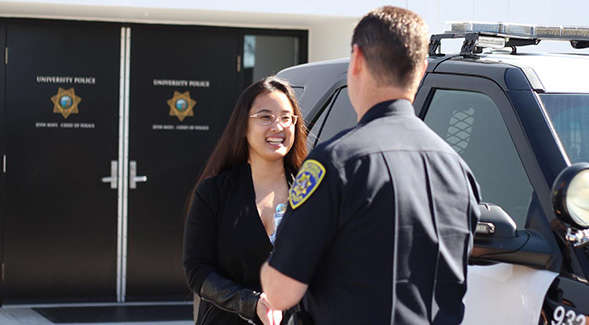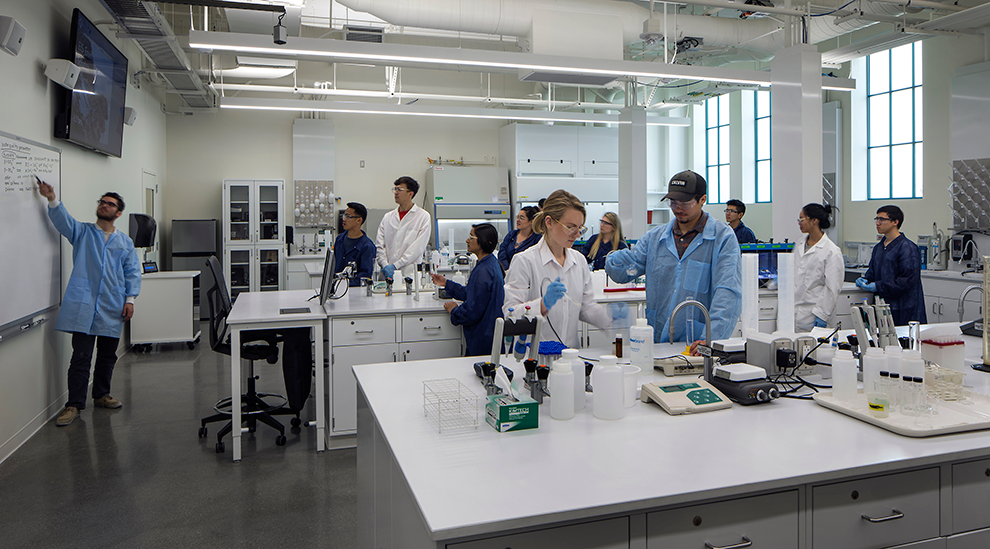Policing With Heart
A new model for responding to incidents with a possible mental-health component values intervention over arrests, and promises to benefit the wider community.

“It’s about intervening and wanting to help.”
From utilizing a social work intern to developing a plan for pairing sworn officers with licensed mental health professionals, San Diego State University police are working to transform the way the campus responds to people in crisis.
The co-responder model takes a collaborative approach to public-safety incidents involving people who may have a mental illness. Widely used across San Diego County, the United States and internationally, it’s a “best practice” approach experts say provides more effective and compassionate mental health support to law enforcement.
The approach is also seen as a benefit to the broader community.
“We need to have the expertise here on campus to make sure that we fill the need,” said Lt. Greg Robertson, who is heading the initiative for SDSU Police Chief Josh Mays. In a three-pronged approach, already underway:
• A graduate student intern from the university’s School of Social Work is conducting a comprehensive review of programs and policies in the SDSU Police Department as a first step toward implementing a more proactive approach of intervention.
• SDSU is on track for funding from the County of San Diego for a specially trained licensed clinician, to be shared with two other campuses, to assist police in responding to mental health crises.
• The university is considering hiring a full-time clinical social worker to support police and provide quick intervention in encounters involving social issues.
This new process promises a “more rehabilitative approach” based on intervention for clients instead of arrests and jail time, said Jennifer Cosio, director of the Consensus Organizing Center at SDSU’s School of Social Work.
The social work intern started at the Police Department in August and will continue for the remainder of the academic year. Supervised by Cosio, graduate student Victoria Dumon has been evaluating how the department typically responds to mental health crises.
During winter break, Dumon spent several days on predawn ride-alongs with the department’s residential housing officer, checking on homeless individuals on and around campus. It’s not a huge population—most homeless services in San Diego are downtown—and it’s a more transitory group that generally doesn’t encamp at the university.
But Dumon said she learned many homeless individuals look to the SDSU area, even if only for a few hours in the day, “because it’s away from a lot of the chaos that is downtown.
“They like to be more alone, they feel safer in this community,” said Dumon. Downtown streets “tend to have a lot of drugs around them, so a lot of people don’t want to go back to that environment.”
Dumon, who also works for the Regional Task Force on the Homeless, was able to connect some of the individuals she encountered with shelters and other services. She plans to repeat the ride-alongs during spring break.
Dumon was also involved with making the argument for the proposed clinician, who would be housed under the county’s Psychiatric Emergency Response Team (PERT). The team pairs licensed mental health professionals with law enforcement personnel to respond to people experiencing a mental health crisis.
Robertson said SDSU proposed the position as a regional asset, to be shared with California State University San Marcos and Southwestern College in Chula Vista. The position could be launched within a year, pending final action by the county.
In 2018, the SDSU Police Department took 51 individuals—mostly people who weren’t students or otherwise affiliated with SDSU—to a county mental health facility or a hospital after responding to a call. Some committals are voluntary, but Robertson said in other cases officers must determine whether a person poses a threat to themselves or others, or are otherwise gravely disabled.
As licensed therapists, Robertson said, credentialed clinicians would be in a better position to assess which course of action is best than are officers focused on enforcement.
Similarly, the department sees a full-time social worker as a chance to do more than simply point someone toward outside resources. This position could focus on a variety of issues beyond mental health, such as food insecurity or experience as a crime victim.
“It’s about intervening and wanting to help,” said Raquel Herriott, special advisor to Chief Mays for community and media relations. “We want to take a more proactive approach to get into the root of (the problem).”



